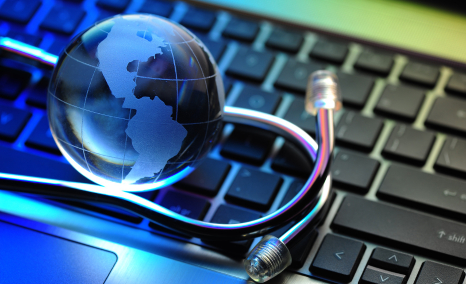Healthcare Mobility Solutions: Revolutionizing Patient Care and Operational Efficiency
Dec 25, 2024
Table of Contents
In the rapidly evolving healthcare sector, technology plays a pivotal role in transforming patient care, improving operational efficiency, and enhancing overall healthcare delivery. One of the most impactful advancements is the integration of healthcare mobility solutions.
From mobile health (mHealth) apps that allow for remote monitoring of vital signs to electronic health records (EHRs) that provide instant access to patient information, mobility solutions are designed to streamline workflows, reduce administrative burdens, and improve patient care delivery. Additionally, telemedicine platforms and virtual consultation tools allow healthcare providers to extend their reach and offer care to patients remotely, further enhancing access to healthcare services.
Downloads
Article in PDF
Recent Articles
- 22 Healthcare Trends & Innovations to Watch in 2022 and Beyond
- The Evolution and Impact of Surgical Cameras in Modern Medicine
- How Healthcare Apps are Adding New Perspectives to the Healthcare Industry?
- The Promise of Big Data in Healthcare: Transforming Treatment and Outcomes
- 8 Game-Changing Applications of Healthcare Mobility Solutions
These solutions leverage mobile technology to streamline processes, improve access to care, and provide real-time data for healthcare providers, patients, and administrators. As healthcare systems face increasing demands for higher quality care, lower costs, and better patient outcomes, mobility solutions are proving to be a game-changer.
Benefits of Healthcare Mobility Solutions
Healthcare mobility solutions offer numerous benefits that significantly enhance patient care and operational efficiency. One of the key advantages is enhanced patient engagement. Mobile health applications and wearable devices allow patients to monitor their health in real time, track vital signs, and receive reminders for medication. This level of engagement empowers patients to take a proactive approach to managing their health, improving adherence to treatment plans, and potentially reducing hospital readmissions. Additionally, these solutions enable seamless communication between patients and healthcare providers, leading to more personalized and timely interventions.
Another major benefit is improved care coordination. Healthcare mobility solutions enable real-time access to patient data, allowing providers to collaborate efficiently across different specialties. With mobile-enabled access to Electronic Health Records (EHRs), doctors, nurses, and other healthcare professionals can instantly view and update patient information, reducing the chances of errors and miscommunications. This leads to better-informed decisions and more comprehensive care, ensuring that patients receive the appropriate treatments without delays.
Moreover, remote monitoring and telehealth are transforming healthcare delivery, particularly for patients with chronic conditions or those living in remote areas. Mobile technologies, including wearable devices and telemedicine apps, facilitate continuous monitoring of patients’ health, allowing providers to intervene early if issues arise. Virtual consultations also help bridge the gap for individuals who have limited access to in-person medical care, reducing the need for travel and improving access to healthcare for underserved populations.

Finally, operational efficiency is significantly enhanced through mobile solutions. Healthcare staff can access patient records, order tests, and update medical histories from anywhere within the facility, reducing the time spent on administrative tasks. This allows for more direct patient care, optimizes workflow, and contributes to overall productivity. By streamlining processes and eliminating manual documentation, healthcare organizations can operate more efficiently, ultimately improving patient outcomes while reducing costs.
Healthcare Mobility Solutions: Market Outlook and Key Players
The adoption of healthcare mobility solutions has accelerated due to the growing demand for more accessible, real-time, and efficient healthcare services. By empowering healthcare workers to access critical data on the go, these solutions not only improve patient care but also enhance operational efficiency and reduce costs for healthcare providers.
The global healthcare mobility solutions market is expected to witness significant growth in the coming years. Key drivers include the increasing adoption of smartphones and tablets by healthcare professionals, the rise of telehealth services, advancements in wireless communication technologies, and the growing demand for remote patient monitoring. Additionally, the COVID-19 pandemic accelerated the shift toward virtual care and remote health monitoring, further fueling the market’s expansion. Furthermore, the rising need for efficient management of healthcare workflows and improved patient engagement is expected to continue driving the demand for mobility solutions across the healthcare sector.
Key players in the healthcare mobility solutions market include large technology companies, healthcare providers, and specialized startups. Notable players include IBM Corporation, Philips Healthcare, Cerner Corporation, Allscripts Healthcare Solutions, and McKesson Corporation. These companies offer a wide range of mobility solutions, including cloud-based platforms, mobile health applications, electronic health record (EHR) integration, and mobile device management solutions. Additionally, companies like Apple, with its wearable devices such as the Apple Watch, and Google, through its health-focused initiatives, have increasingly entered the healthcare mobility space, providing innovative solutions aimed at improving patient monitoring and overall healthcare experiences.

The competitive landscape of healthcare mobility solutions is marked by significant innovation, with companies focusing on developing new technologies such as artificial intelligence, machine learning, and Internet of Things (IoT) integrations. As patient data privacy and cybersecurity remain critical concerns, solutions that comply with healthcare regulations such as HIPAA in the U.S. and GDPR in Europe are essential. The market is also witnessing increased investments in research and development, partnerships, and collaborations to expand the scope of healthcare mobility solutions, making them more comprehensive, efficient, and accessible to healthcare providers and patients worldwide.
Healthcare Mobility Solutions: Challenges and Considerations
One of the major challenges healthcare organizations face when implementing mobility solutions is data privacy and security. Mobile devices, while convenient, increase the risk of cyberattacks and data breaches. Sensitive patient data, if not properly encrypted and protected, can be exposed to unauthorized parties. Healthcare organizations must invest in robust cybersecurity infrastructure, such as encrypted data transmission, secure logins, and multi-factor authentication, to ensure that patient privacy is maintained. Additionally, compliance with regulations such as HIPAA (Health Insurance Portability and Accountability Act) must be a priority, requiring constant vigilance and updates to security protocols.
Integration with legacy systems is another significant challenge in adopting mobile healthcare solutions. Many healthcare providers still rely on older IT systems that may not be compatible with modern mobile technology. This can create barriers when attempting to integrate new mobile tools with existing electronic health records (EHR), hospital management software, and other backend systems. The cost and complexity of such integrations can deter smaller healthcare providers from adopting these solutions, even though the long-term benefits may far outweigh the initial investment. Therefore, proper planning and coordination are necessary to ensure seamless integration without disrupting patient care.
Finally, training and adoption represent a crucial hurdle for the successful implementation of healthcare mobility solutions. Healthcare professionals may be resistant to using new technologies, especially if they are not user-friendly or require significant changes to existing workflows. Without proper training, staff may struggle to fully utilize mobile solutions, leading to inefficiencies and reduced effectiveness. Additionally, ongoing support and updates are essential to maintain high levels of adoption and usage. Organizations must ensure that healthcare providers are not only trained but also have access to continuous education and technical support to keep pace with rapidly evolving mobile technologies.
The Future of Healthcare Mobility Solutions
The future of healthcare mobility solutions is poised for groundbreaking advancements, driven by emerging technologies such as Artificial Intelligence (AI), blockchain, and Internet of Things (IoT). AI-powered decision support systems will be integrated into mobile platforms, providing healthcare providers with real-time, data-driven insights to make more informed and personalized treatment decisions.
As AI continues to evolve, it will enhance diagnostic accuracy, predict patient outcomes, and even automate routine tasks, freeing up healthcare professionals to focus more on patient care. Additionally, IoT-enabled devices will create a more connected healthcare ecosystem, allowing for seamless communication between wearables, remote monitoring tools, and healthcare providers. This level of integration will lead to a highly efficient and real-time approach to patient care.
The integration of blockchain technology will further revolutionize healthcare mobility solutions by ensuring secure, decentralized data management. Blockchain can streamline medical records management, providing patients with full control over their health data while maintaining confidentiality and security. Furthermore, augmented reality (AR) and virtual reality (VR) are expected to play a significant role in the future of healthcare.
These technologies will assist in training healthcare providers, offering immersive simulations for surgery preparation, and enabling remote guidance for complex procedures. As these technologies mature, healthcare mobility solutions will continue to evolve, offering an even more patient-centered and efficient healthcare experience that enhances both clinical outcomes and operational workflows.

Downloads
Article in PDF
Recent Articles
- 22 Healthcare Trends & Innovations to Watch in 2022 and Beyond
- Medication Management Systems: The Key to Optimizing Pharmaceutical Care
- 7 Key Technologies Pioneering Cybersecurity in the Healthcare Sector
- Telehealth: Opportunities and Hurdles in Virtual Healthcare Market
- Digital Health: Insights Into the Key Transformative Trends & Evolving Market Dynamics



